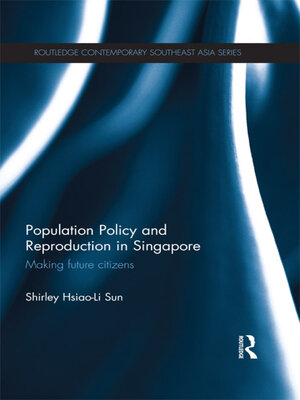Population Policy and Reproduction in Singapore
ebook ∣ Making Future Citizens · Routledge Contemporary Southeast Asia
By Shirley Hsiao-Li Sun

Sign up to save your library
With an OverDrive account, you can save your favorite libraries for at-a-glance information about availability. Find out more about OverDrive accounts.
Find this title in Libby, the library reading app by OverDrive.



Search for a digital library with this title
Title found at these libraries:
| Library Name | Distance |
|---|---|
| Loading... |
This book examines the relationship between population policies and individual reproductive decisions in low-fertility contexts. Using the case study of Singapore, it demonstrates that the effectiveness of population policy is a function of competing notions of citizenship, and the gap between seemingly neutral policy incentives and the perceived and experienced disparate effects.
Drawing on a substantial number of personal interviews and focus groups, the book analyzes the developmental welfare state's overarching emphasis of citizen responsibility, and examines population policies that reinforce social inequalities and ignore cultural diversity. These factors combine to undermine elaborate state policy efforts in encouraging citizens' biological reproduction. The book goes on to argue that in order to facilitate positive fertility decisions, the state needs to modify the "economic production at all cost" approach and pay much more attention to the importance of social rights. This suggests that the Singapore government might profitably approach the phenomenon of very low fertility with major initiatives similar to those of other advanced industrialized societies. This book offers a significant contribution to the literature on social policy, East Asian and Southeast Asian studies.







